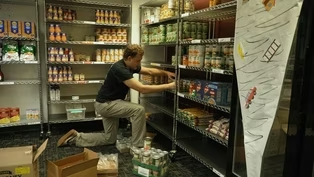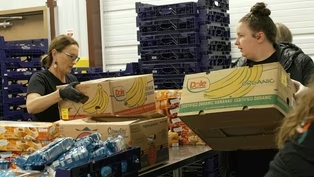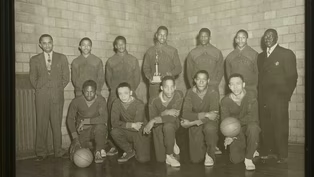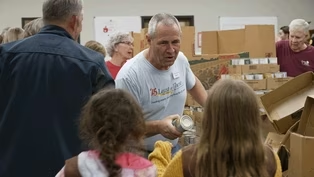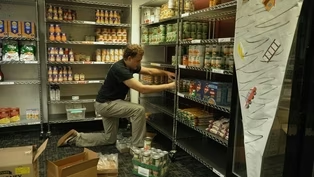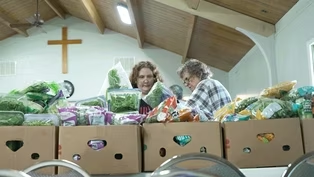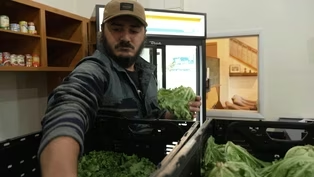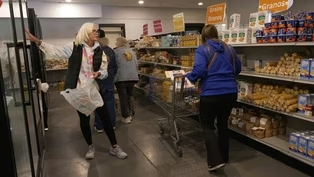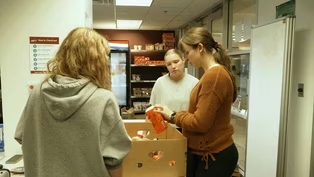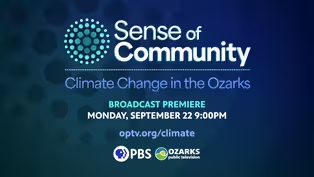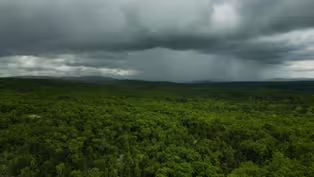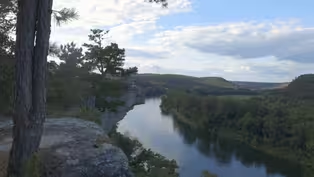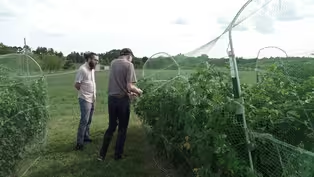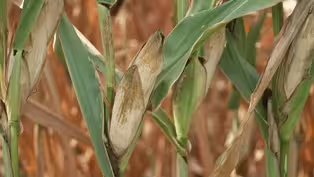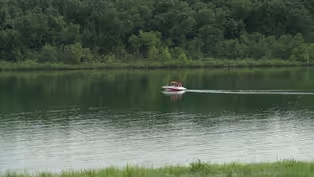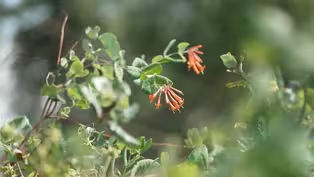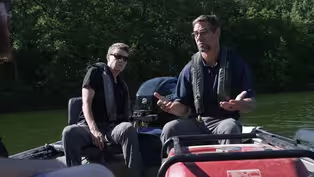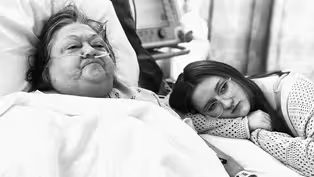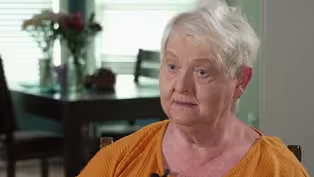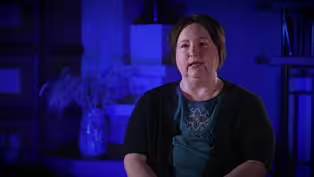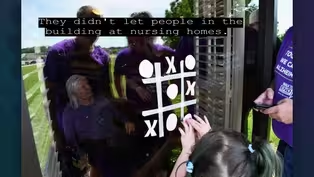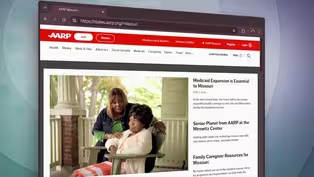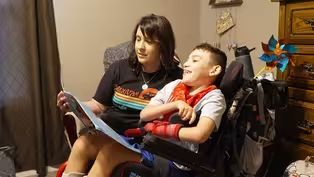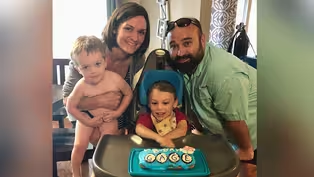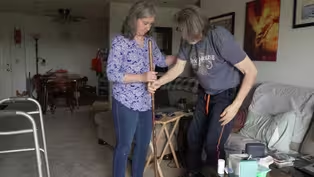Sense of Community
Our Changing Ozarks Climate
Clip | 5m 30sVideo has Closed Captions
Experts weigh in on the impacts of climate change on the Ozarks and suggest possible solutions.
Climate change affects the Ozarks through increased rainfall and flooding., Experts Toby Dogwiler and William Gutowski weigh in on the causes and solutions to this global problem with local impacts.
Problems playing video? | Closed Captioning Feedback
Problems playing video? | Closed Captioning Feedback
Sense of Community is a local public television program presented by OPT
Sense of Community
Our Changing Ozarks Climate
Clip | 5m 30sVideo has Closed Captions
Climate change affects the Ozarks through increased rainfall and flooding., Experts Toby Dogwiler and William Gutowski weigh in on the causes and solutions to this global problem with local impacts.
Problems playing video? | Closed Captioning Feedback
How to Watch Sense of Community
Sense of Community is available to stream on pbs.org and the free PBS App, available on iPhone, Apple TV, Android TV, Android smartphones, Amazon Fire TV, Amazon Fire Tablet, Roku, Samsung Smart TV, and Vizio.
[AUDIO LOGO] I think the most important changes we're seeing in the Midwest, the ones that are going to affect us economically and personally, are in the precipitation patterns and amounts that we're seeing.
It's precipitation and that effect that it has on the crops we grow, the cost of home ownership, and in flooding, that's really the climate change impact that does have the biggest effect on our day-to-day life right now.
WILLIAM GUTOWSKI: We've been burning fossil fuels for quite some time now.
By that, I mean especially coal and then petroleum.
And in doing that, it releases carbon dioxide into the atmosphere.
Carbon dioxide acts, in a rough sense, like putting on a blanket because the Earth arrives at its temperature by getting heat-- energy-- from the sun.
And then the Earth radiates energy back to space, and so it loses heat.
So there's a balance between what's coming in and what's going out.
And when we increase the greenhouse gases, well, we block some of that ability of the Earth to send energy back to space.
And so that's causing the planet to warm up in a general sense.
TOBY DOGWILER: At the fundamental level, the warmer the air is, the more moisture it can hold.
A lot of the moisture that falls as rainfall in the Midwest is sourced in the Gulf of Mexico.
So that water precipitating out of the sky, it's coming from either the Gulf of Mexico or the Pacific Ocean.
A lot of it's from the Gulf, and the Gulf is record hot.
It's been record hot for years.
And so you've got this big, hot body of water down there.
It's evaporating a lot of water.
Air currents, weather patterns move that up into the Midwest.
So we get all this warm, juicy, moist air that comes up here and then gets wrung out as precipitation.
We have fewer storms.
And the duration of storms is shorter than it used to be.
But when it does rain, it rains harder.
And we get more rain out of the storm.
And we get higher average annual precipitation than we used to.
So we're getting more rain, but we're getting it in fewer, more intense events.
That also means that there's a longer period between storms on average.
So we're more exposed to drought, ironically.
We're getting more rain.
But we're also-- especially in the Ozarks, where we don't have thick soils.
We don't have the ability to store a lot of soil moisture.
We're getting a lot of rain, but it's coming too fast and too hard for us to really capture all that.
A lot of it just runs off-- higher stream flows, more floods.
We know that climate varies.
There's no question about that.
What's different about what's going on in the last hundred years, and really a lot in the last 30 years is, the rate.
There's no time in the geologic record where we ever see-- in all those hundreds of millions of years-- there's no time where we see rates of change like we're seeing now.
It's never changed this fast.
The only reason that it's changing this fast is because of CO2 being released by the burning of fossil fuels, deforestation, things like that.
That's the difference.
That was never happening in the past.
So it's really that simple.
And we know that the excess CO2 is from the burning of fossil fuels.
There's really no debate about that.
It's not a controversial statement to make in scientific circles.
I think there's also fear.
It's fear of the change.
How's it going to affect us?
What are we going to do about it?
How much is it going to cost us?
And it's really easy psychologically to just try to ignore it, put our heads in the sand.
I think there are solutions that are out there that can work, that can be market driven, that would be seen as a strong compromise by most people.
And we just have to get back to a point where we can talk about and consider those.
There is a cost in the long term to not doing anything.
And just like many things in life, it's going to be cheaper to deal with this problem now than to leave it to our kids or grandkids to finally deal with it later because their options are going to be much more limited at that point, because a lot of the change will be baked into the cake.
The longer we wait, the higher that cost is.
So the question is, how much do we want it to cost?
We need to learn how to have civil conversations with one another about this.
We need to learn how to discuss this.
This is something that's real.
It's something that's affecting us all.
It's going to affect future generations.
If we learn how to talk about it, then we can learn how to communicate what we want our politicians to do, people who represent us.
WILLIAM GUTOWSKI: Efforts to promote what you might call sustainable energy, especially wind energy, solar energy, have been growing here in the Midwest.
So things that stop the burning of fossil fuels would certainly be a step in the right direction.
If everybody started to make changes, it's moving things in the right direction.
These changes aren't going to cause major changes overnight.
But I try to get people to think about what the future holds for their children and their children's children and to give it some context about what kind of a world they want to provide for their children and grandkids.
And one person by themselves isn't going to cause the world to change.
But if we all do this together, that collective behavior of everyone does make a difference.
There's no question about it.
TOBY DOGWILER: But it also creates an ethos.
When you feel like you've got skin in the game because, hey, I'm doing my part, I'm doing something, then you're also going to be more likely to advocate.
You're setting a good example for your children.
You make those things normal.
And then that makes it more likely that we can get the political change to make the really big differences.
[SUBTLE MUSIC]
Preview | 30s | Ozarks nonprofits strive to make sure no one goes hungry (30s)
Video has Closed Captions
Clip | 2m 15s | Ozarks Food Harvest partners with another local nonprofit to provide fresh produce for those in need (2m 15s)
Video has Closed Captions
Clip | 2m 30s | Joplin area residents come together each week to help a local nonprofit feed their community (2m 30s)
Video has Closed Captions
Clip | 2m 10s | A food pantry in Ozark provides, food, education and resources to those in need (2m 10s)
Video has Closed Captions
Clip | 2m 30s | Families in the Ozarks face difficult choices between buying food and paying rent (2m 30s)
Video has Closed Captions
Clip | 2m | Volunteers make sure unused crops get to those facing hunger (2m)
Video has Closed Captions
Clip | 2m | Community fridges across Springfield are helping to feed those who would otherwise go hungry (2m)
Video has Closed Captions
Clip | 2m 20s | Christian Action Ministries works to fill a need in Stone and Taney Counties (2m 20s)
Video has Closed Captions
Clip | 2m 20s | The Bear Pantry challenges conceptions of what food insecurity looks like (2m 20s)
Video has Closed Captions
Clip | 20s | Climate Change in the Ozarks - Broadcast Premiere Sept, 22 at 9pm (20s)
Video has Closed Captions
Clip | 5m 30s | Experts weigh in on the impacts of climate change on the Ozarks and suggest possible solutions. (5m 30s)
Video has Closed Captions
Clip | 5m 45s | Climate change creates greater rainfall in the Ozarks, negatively impacting our rivers. (5m 45s)
Video has Closed Captions
Clip | 3m 10s | Ozarks researchers work diligently to provide solutions to agricultural challenges (3m 10s)
Video has Closed Captions
Clip | 3m 48s | A local farmer describes the challenges of growing crops in a changing Ozarks climate. (3m 48s)
Video has Closed Captions
Clip | 3m 50s | As a growing population in the Ozarks consumes more water, the need for new sources arises. (3m 50s)
Video has Closed Captions
Clip | 3m 2s | Native plants serve as a unique solution to the obstacles faced by Ozarks wildlife and habitat. (3m 2s)
Video has Closed Captions
Clip | 3m 51s | Floating wetlands present a unique solution to the problem of algal blooms in the Ozarks. (3m 51s)
Video has Closed Captions
Clip | 1m 45s | Young caregivers, often driven by gender norms, face challenges but grow personally (1m 45s)
Awareness Rising: The Future of Caregiving
Video has Closed Captions
Clip | 1m 58s | Experts stress caregiving awareness; hospice care users share how it deepened their bond (1m 58s)
Video has Closed Captions
Clip | 2m | Caregivers reflect on emotional toll, stress rest, reflection, and daily joy to reframe caregiving (2m)
Video has Closed Captions
Clip | 1m 58s | COVID isolation impacted personal connection's role in health and happiness (1m 58s)
Tackling Missouri’s Dementia Crisis
Video has Closed Captions
Clip | 1m 50s | 130,000 Missourians have dementia; 250,000 unpaid caregivers face isolation, service gaps. (1m 50s)
Redefining Care: Finding Support and Recognition
Video has Closed Captions
Clip | 1m 50s | Caring for a disabled child brings emotional, financial hurdles; need for better access to support (1m 50s)
Video has Closed Captions
Clip | 1m 58s | Caregivers share emotional struggles while experts suggest therapy, and peer support for stress. (1m 58s)
Video has Closed Captions
Clip | 1m 50s | Caregivers often experience depression, fatigue, and medical crises, and emotional strain (1m 50s)
Providing Support for PBS.org
Learn Moreabout PBS online sponsorship
- News and Public Affairs

Top journalists deliver compelling original analysis of the hour's headlines.

- News and Public Affairs

FRONTLINE is investigative journalism that questions, explains and changes our world.












Support for PBS provided by:
Sense of Community is a local public television program presented by OPT
